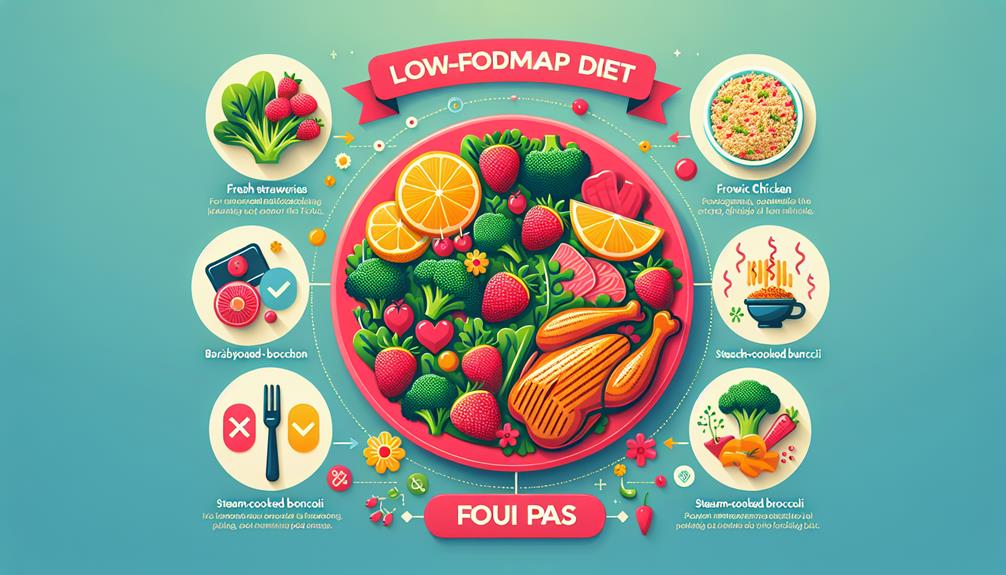Imagine your digestive system as a delicate balancing act, where even the slightest disruption can cause discomfort and frustration. Irritable Bowel Syndrome (IBS) is like a wild card, throwing this delicate balance off track, leaving you searching for a solution. Enter the FODMAP diet – a powerful tool that offers relief and control over your digestive health. But what exactly is the FODMAP diet, and how can it help you manage IBS? In this discussion, we will explore the ins and outs of this dietary approach, uncover its benefits, and learn how to successfully implement it into your life. So, get ready to regain control over your digestive health and bid farewell to those IBS symptoms that have been holding you back.
Key Takeaways
- The FODMAP diet is a scientifically-backed approach to managing digestive health, specifically for individuals with Irritable Bowel Syndrome (IBS).
- Following the FODMAP diet can lead to a reduction in symptoms such as bloating, abdominal pain, diarrhea, and constipation.
- The three main phases of the FODMAP diet are elimination, reintroduction, and personalization.
- It is important to work with a registered dietitian specialized in the FODMAP diet to successfully follow the diet and manage IBS symptoms.
What Is the FODMAP Diet?
The FODMAP diet is a scientifically-backed approach to managing digestive health that aims to reduce symptoms associated with certain types of carbohydrates. FODMAP stands for Fermentable Oligosaccharides, Disaccharides, Monosaccharides, and Polyols. These are a group of short-chain carbohydrates that are poorly absorbed in the small intestine, leading to digestive symptoms in some individuals.
The FODMAP diet works by eliminating or reducing the intake of high-FODMAP foods and then gradually reintroducing them to determine which specific carbohydrates trigger symptoms. The diet involves three main phases: elimination, reintroduction, and personalization.
During the elimination phase, high-FODMAP foods such as wheat, onions, garlic, and certain fruits and vegetables are avoided. This phase typically lasts for 2-6 weeks, depending on individual symptoms and response.
After the elimination phase, the reintroduction phase begins. This involves systematically reintroducing high-FODMAP foods to identify individual triggers. It is important to note that this phase should be done under the guidance of a healthcare professional or a registered dietitian.
Finally, the personalization phase involves creating an individualized diet plan based on the specific triggers identified during the reintroduction phase. This phase aims to strike a balance between managing symptoms and maintaining a varied and nutritious diet.
Understanding FODMAPs and following the FODMAP diet basics can help individuals with digestive issues find relief from symptoms and improve their overall digestive health. However, it is always recommended to consult with a healthcare professional before making any significant changes to your diet.
Benefits of the FODMAP Diet for IBS
The FODMAP diet has been shown to provide significant benefits for individuals with irritable bowel syndrome (IBS), helping to alleviate symptoms and improve overall digestive health. One of the main benefits of the FODMAP diet is the reduction of IBS symptoms. Research has shown that following a low FODMAP diet can help reduce bloating, abdominal pain, diarrhea, and constipation, which are common symptoms of IBS. By eliminating high FODMAP foods from your diet, you can reduce the amount of fermentable carbohydrates that reach your large intestine, thus reducing symptoms.
In addition to symptom reduction, the FODMAP diet can also have long-term effects on digestive health. By identifying and eliminating trigger foods, you can better manage your IBS symptoms and improve your overall quality of life. The FODMAP diet is not meant to be followed long-term, as it restricts certain types of carbohydrates that are important for gut health. However, by following the FODMAP diet for a short period of time and then gradually reintroducing FODMAP foods, you can identify your individual triggers and develop a personalized diet plan that works for you. This can lead to long-term symptom management and improved digestive health.
How to Follow the FODMAP Diet

To successfully adhere to the FODMAP diet, it is important to carefully plan your meals and make informed food choices. Here are three key steps to help you follow the FODMAP diet effectively:
- Educate yourself: Familiarize yourself with the list of high FODMAP foods to avoid, as well as low FODMAP alternatives that you can include in your meals. There are many online resources and apps available that provide comprehensive lists and information about FODMAPs.
- Create a FODMAP diet meal plan: Plan your meals in advance to ensure you have suitable options available. Consider incorporating FODMAP diet recipes that are specifically designed to be low in FODMAPs. This will help you avoid high FODMAP ingredients and make it easier to stick to the diet.
- Gradually reintroduce FODMAPs: After following the strict elimination phase of the FODMAP diet, it is important to reintroduce FODMAPs systematically to identify your individual tolerance levels. Keep a food diary to track any symptoms and work with a registered dietitian to guide you through this process.
Identifying High-FODMAP Foods
Identifying high-FODMAP foods is an essential step in effectively following the FODMAP diet for digestive health. Food elimination and symptom tracking are two key strategies to identify which foods may be triggering your symptoms of irritable bowel syndrome (IBS).
To begin, you will need to eliminate all high-FODMAP foods from your diet for a certain period of time, typically two to six weeks. This means avoiding foods that are known to contain high levels of fermentable carbohydrates such as lactose, fructose, fructans, galactans, and polyols. Common high-FODMAP foods include wheat, onions, garlic, apples, pears, honey, milk, and certain legumes.
During the elimination phase, it is crucial to keep a detailed food and symptom diary. This will help you track any changes in your symptoms as you eliminate and then reintroduce specific foods. Each time you reintroduce a high-FODMAP food, monitor your symptoms closely for any signs of digestive discomfort, such as bloating, gas, abdominal pain, or diarrhea.
Tips for Successfully Managing IBS With the FODMAP Diet

To effectively manage irritable bowel syndrome (IBS) with the FODMAP diet, it is important to implement certain tips that can help alleviate symptoms and improve digestive health. Here are three key tips to successfully manage IBS with the FODMAP diet:
- Meal Planning: Planning your meals in advance can greatly assist in managing IBS symptoms. Take some time to research and gather low-FODMAP recipes and ingredients. By having a well-thought-out meal plan, you can ensure that you are consuming the right foods and avoiding trigger foods. Additionally, consider batch cooking and meal prepping to make it easier to stick to your dietary restrictions throughout the week.
- Dining Out: Eating out can be challenging when following the FODMAP diet, but it is not impossible. Before dining out, research restaurants that offer low-FODMAP options or are willing to accommodate dietary restrictions. When ordering, communicate your needs clearly to the server or chef. Request modifications to the menu items, such as removing high-FODMAP ingredients or substituting them with low-FODMAP alternatives. Being proactive and prepared will make dining out a more enjoyable experience.
- Seek Professional Guidance: Consulting a registered dietitian who specializes in the FODMAP diet can be immensely beneficial. They can guide you through the process, help you understand the intricacies of the diet, and provide personalized advice on meal planning and dining out. A dietitian can also address any concerns or questions you may have, ensuring that you are on the right track to managing your IBS effectively.
Frequently Asked Questions
Can the FODMAP Diet Cure Irritable Bowel Syndrome (Ibs)?
The FODMAP diet can help manage IBS symptoms, but it doesn't necessarily cure the condition. It has its limitations and success stories vary. It's important to consult a healthcare professional for personalized advice.
Are There Any Long-Term Side Effects of Following the FODMAP Diet?
You may wonder about the long-term effects of the FODMAP diet and its impact on the gut microbiome. Evidence suggests that the diet can improve IBS symptoms without significant adverse effects on your health.
Can the FODMAP Diet Be Used for Other Digestive Conditions Besides Ibs?
Yes, the FODMAP diet can be used for other digestive conditions besides IBS. It has been shown to be effective in managing symptoms of conditions like Crohn's disease, ulcerative colitis, and SIBO, promoting overall gut health.
Is It Necessary to Strictly Eliminate All High-Fodmap Foods or Can Some Be Tolerated in Small Amounts?
It's important to strictly eliminate high-FODMAP foods, but some individuals may be able to tolerate small amounts. However, it's best to consult with a healthcare professional to determine your specific needs.
Are There Any Specific Supplements or Medications That Should Be Taken While Following the FODMAP Diet?
When following the FODMAP diet, it is important to consider supplement recommendations and medication options. These can provide additional support in managing symptoms and promoting digestive health. Consult with a healthcare professional for personalized advice.
Conclusion
In conclusion, the FODMAP diet offers a promising solution for managing symptoms of Irritable Bowel Syndrome (IBS). By eliminating high-FODMAP foods and gradually reintroducing them, individuals can identify their trigger foods and find relief from digestive discomfort. This evidence-based approach has been shown to be effective in reducing IBS symptoms and improving overall digestive health. By following the FODMAP diet, individuals can take control of their IBS and live a more comfortable and fulfilling life.













